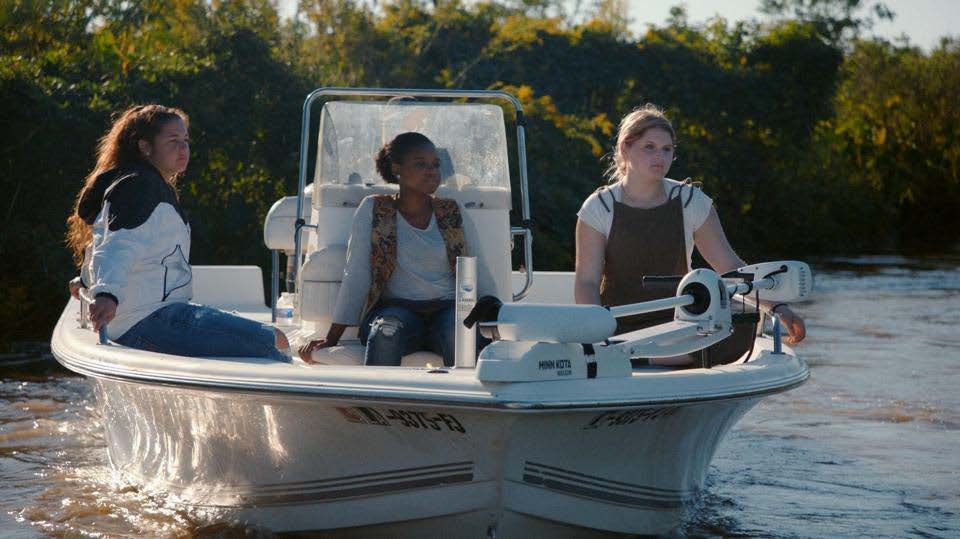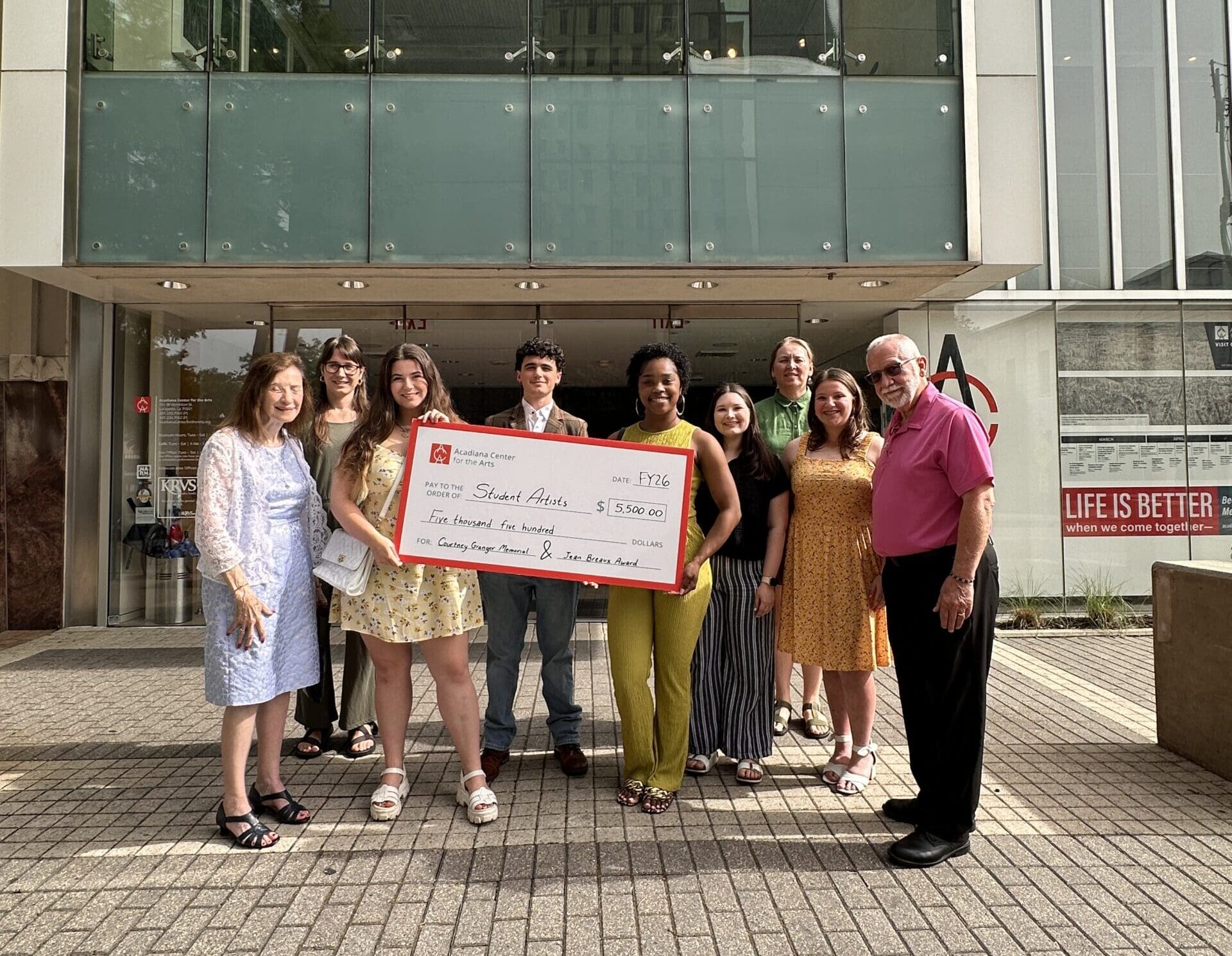Acadiana Center for the Arts hosts film screening of a new documentary that explores the history & causes of climate crisis in Louisiana

2022 // USA // Documentary // English 73 minutes
Doc Follows Three Teenagers as They Discover Why Louisiana is Sinking, & What it Means for Them Film Advisory Team Includes Acclaimed Filmmaker Ken Burns
LAFAYETTE, LA – HOLLOW TREE, a new feature documentary that follows three Louisiana teenagers as they discover how the history of the Mississippi River shapes their lives in a time of climate crisis, is screening at Acadiana Center for the Arts on April 2nd.
The evening kicks off with a public reception featuring music by Dickie Landy, and concludes with a Q & A session after the film.
Tickets can be purchased here: https://acadianacenterforthearts.org/events/hollow-tree-screening
HOLLOW TREE marks the directorial feature debut of New Orleans resident Kira Akerman. Akerman has been working as a filmmaker in Louisiana since 2011 and also partners with the educational nonprofit Ripple Effect, which pioneers k-12 water literacy education. She is well versed in Southern landscapes and geographic history.
The film was produced by Monique Walton (“Bull,” Cannes 2019 – Un Certain Regard, Samuel Goldwyn, Sony) and Chachi Hauser (“The Rat,” Sundance 2019). Acclaimed filmmaker Ken Burns served as a creative advisor. The film also received funding support from The Sundance Institute, The Harnisch Foundation, Artemis Rising Foundation, The JPB Foundation and Fork Films, among others.
The 73-minute documentary tells the story of three young women, all teenagers at the start of production, traversing the waters of the South, their history, and their future. Mekenzie Fangy (Houma, Louisiana) was born on coastal bayous and is a Houma Indian, Annabelle Pavy (Lafayette, Louisiana) is from a mostly white community, where climate change is largely viewed as a myth, and Tanielma DaCosta (Baton Rouge, Louisiana) immigrated from Angola, Africa when she was 6. These three young women share their unique family histories, looking at the intersection of land use and the environment and how their personal stories are part of the larger landscape – one that has lost a striking 1,900 square miles of land (a land mass the size of Delaware) since 1932, due to dredging for oil and gas and the engineering of the Mississippi River.
The three are on a journey to understand the environment. For the first time, they notice the Mississippi River’s engineering, stumps of cypress trees, and polluting refineries. Their different perspectives—as Indigenous, white, and Angolan-American young women—shape their story of the climate crisis. “I learned about the importance of growing together,” said Pavy, one of the young women in the film. “We are from different places, but we shared our knowledge and perspective.”
Producers Monique Walton and Chachi Hauser said, “We interviewed many young people across the state about changes that they were noticing in their environment. Most didn’t know that they lived in a place that is sinking, or have any understanding of why it floods so frequently. Mekenzie Fanguy, Tanielma DaCosta, and Annabelle Pavy stood out as being exceptionally curious, receptive to other points of view, and open to the adventures of filmmaking.”
HOLLOW TREE director Akerman said, “Our film explores climate change through the experience of place, looking holistically at the interactions among people, animals, and plantlife. The three young people lead us on this exploration of the present that relies heavily on a history that is often hidden but available to those who look. We are so appreciative that they allowed us to follow their journey.”
“My idea was to use filmmaking as a classroom for experiential learning,” Akerman added, “and to try to develop a documentary practice for the climate crisis.” As Akerman encourages these young women to notice their surroundings, she explained, “they begin to imagine Louisiana’s past — its history of slavery, Indigenous dispossession, and colonization — and, by extension, Louisiana’s future. The one that they will help to shape.”
“Our film uniquely centers young people coming to understand that they’ve inherited a history of colonialism and white supremacy,” said Hauser and Walton. “The climate crisis is not merely defined by flooding and sinking land, but who is protected and who is not.”
“The residue of slavery still has its grips in the South,” added Pavy, one of the teenagers.
“The young women in the film demonstrate that learning one’s history — through talking to someone whose great-grandparent was emancipated from slavery, for example— can be a starting point for real change… for imagining solutions to the climate crisis that don’t merely sustain racial injustices,” explained Akerman.
“I’ve long been fascinated by how our experience of place is influenced by the past, and decisions that we were not even aware of,” said Ken Burns, who served as an advisor to the film. “Kira and her team made the radical decision to listen – to the river, the land, to the animal and plant life and to the young women who are trying to understand their changing world. The result is an extraordinary film that asks all of us to think differently about the communities in which we live and the environments that we must respect.”
“HOLLOW TREE is a tool for a cultural shift in how we understand the climate crisis,” explained Walton and Hauser. “While severe weather is often linked to climate change, the climate crisis is usually presented as something too big to understand, an abstraction that predicts doom with no real connection to our communities.”
The film counters this by bringing these young people to different sites along the Mississippi River, and engaging them in dialogue with engineers, activists, and Indigenous leaders in their respective communities. “The first step,” said DaCosta, one of the three young women in the film, “is to look around.” Through learning about the places they live, these young women step into their agency.
HOLLOW TREE espouses the belief that individuals are capable of sparking broader change, and that knowing oneself and one’s history matters in imagining and designing a better future. The intention is to empower these young women to inspire their peers to ask questions, to talk to their elders, to notice their changing environments, and to meaningfully engage their communities. The film is a model for communities everywhere to confront the climate crisis.
“I hope people open their eyes so we can make moves and keep our forever home,” said Fanguy, another of the young women in the film, who lives at the bottom of Louisiana’s proverbial boot and has lost large swaths of ancestral lands in her short lifetime.
“We have elevated the expertise of women,” said Akerman’s creative team, “especially women of color, both behind and in front of the camera.”
The filmmaking team is devising a robust impact campaign plan for screenings in schools, libraries, churches, museums, and outdoor venues — first in Louisiana, and then nationally and internationally. Curricular resources, teacher training materials, an all-ages activity book and discussion guides for the film are in development. They recently received a Sundance Institute Documentary Fund grant for Impact.
“We aim,” Akerman continued, “to reach a young adult audience and those most at risk to rising seas, land loss and flooding, especially communities of color and under-resourced communities in the Gulf South.”
The film debuts in the place it was made, with conversations with community leaders at each showing. The intention is to inspire communities to take action —with young people at the helm.
“Young people don’t really feel heard or feel like they have a voice to begin with,” said DaCosta. “I hope the film will help people feel empowered to look at what’s going on within themselves, their community, and their environment and to build connections.”
HOLLOW TREE is a production of Inhere. Producers: Monique Walton and Chachi Hauser. Executive producers: Jolene Pinder and Hayden Reilly. Co-executive producers: Regina K. Skully, Bill and Ruth Ann Harnisch (The Harnisch Foundation), and Abigail Disney. Made possible with the generous support of The JPB Foundation, Fork Films, The William F. Harnisch Foundation, Artemis Rising Foundation, Sundance Institute Documentary Film Program with support from the Kendeda Fund, The Redford Center with funding provided by the New York Community Trust, National Endowment for the Arts, International Documentary Association Enterprise Documentary Fund, Southern Documentary Fund, New Orleans Center for the Gulf South at Tulane University, Southern Producers Lab | New Orleans Film Society, Climate Story Lab – US South, and The Gotham Film & Media Institute.



